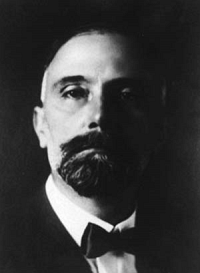Carlo Sforza
Carlo Sforza ( born January 24, 1872 in Montignoso, † September 4, 1952 in Rome ) was an Italian politician.
Carlo Sforza came from a branch of the once influential noble family Sforza. In 1896 he joined the diplomatic service of his native country. 1911 to 1915 he was chargé d'affaires in Beijing and then to 1918 in Serbia. In 1919 he was first Undersecretary of State, 1920 Foreign Minister in the cabinet of Giovanni Giolitti. He fought for reconciliation with Yugoslavia and was willing to compromise, especially in the debate about Rijeka. Thus he got into the Italian public pressure, particularly on the part of supporters of Mussolini. In June 1921 he resigned as Prime Minister.
1922 Sforza became the ambassador in Paris, this place was, however, after a few months back because he did not want to serve the new fascist rulers in Rome. International called this step, as well as the following identical decision of the Ambassador in Berlin, Frassati, a sensation produced. 1927 had to go into exile, which he spent in France, England, Switzerland and from 1940 in the U.S. Sforza. During this time he drew up plans for a Central European and mittelmeerländische Federation.
Already in October 1943 Sforza returned to Italy. In 1945 he took over the presidency of the Consulta Nazionale ( one appointed by the Government Transitional Federal Parliament ), 1946 he was elected to the Constituent Assembly. In the same year he joined the Partito Repubblicano Italiano in, from 1947 to 1951 he served under Prime Minister Alcide De Gasperi, the Foreign Minister, reaching at this time the accession of Italy to NATO. In 1947 he was instrumental in the abdication of King Victor Emmanuel III. with, in 1949, he developed the Bevin - Sforza plan.










